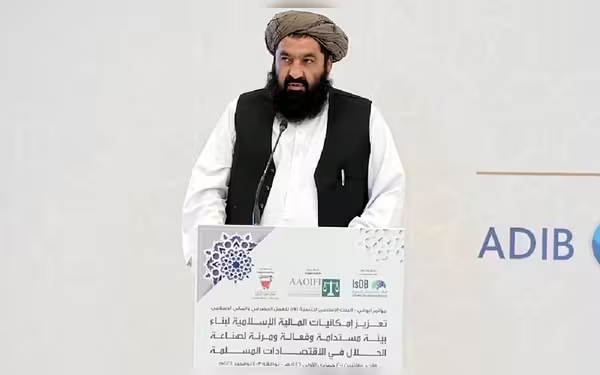Saturday, November 16, 2024 09:42 PM
DAB Governor Urges Global Support for Afghanistan's Banking System
- DAB governor calls for global Islamic financial assistance.
- Emphasis on capacity building and Islamic banking transition.
- Need for structured management of Zakat and Waqf.
 Image Credits: thefrontierpost
Image Credits: thefrontierpostDAB Governor Noor Ahmad Agha calls for global support to enhance Afghanistan's banking system and transition to Islamic finance.
The banking system in Afghanistan has faced numerous challenges over the years, particularly in the wake of political and economic instability. As the country seeks to rebuild and modernize its financial sector, the call for assistance from global Islamic financial institutions has become increasingly urgent. Recently, Noor Ahmad Agha, the governor of Da Afghanistan Bank (DAB), made a significant appeal for support during a conference in Bahrain, highlighting the need for collaboration to enhance the banking landscape in Afghanistan.
During the 19th annual Islamic banking and finance conference, Agha emphasized several key areas where help is needed. He pointed out the importance of capacity building and training programs to equip local banking professionals with the necessary skills. Additionally, he called for better management of Zakat and Waqf, which are essential components of Islamic finance that promote social welfare and community support.
Agha's address also touched on the critical transition from conventional banking to Islamic banking systems. This shift is vital for aligning Afghanistan's financial practices with Islamic principles, which prohibit Riba, or interest-based lending. By moving towards a Halal banking system, Afghanistan can create a more equitable financial environment that benefits all citizens.
The conference, attended by central banks from various Islamic countries and nearly 300 representatives from Islamic commercial banks, provided a platform for discussing these pressing issues. Agha's emphasis on establishing institutions dedicated to regulating Zakat, Waqf, Infaq, and Sadaqah underscores the need for a structured approach to wealth distribution in society. Such institutions can play a pivotal role in ensuring that resources are allocated fairly and effectively.
Moreover, the governor raised concerns about the stability of the banking system in Afghanistan, which is crucial for fostering economic growth and attracting foreign investment. The development of Islamic banking is not just a financial necessity; it is also a moral imperative that aligns with the values of the Afghan people.
The call for assistance from global Islamic financial institutions is a step towards creating a sustainable and resilient banking system in Afghanistan. By focusing on capacity building, effective management of Islamic financial principles, and the establishment of dedicated institutions, Afghanistan can pave the way for a brighter economic future. The journey may be challenging, but with the right support and commitment, the Afghan banking sector can emerge stronger and more inclusive, ultimately benefiting the entire nation.













